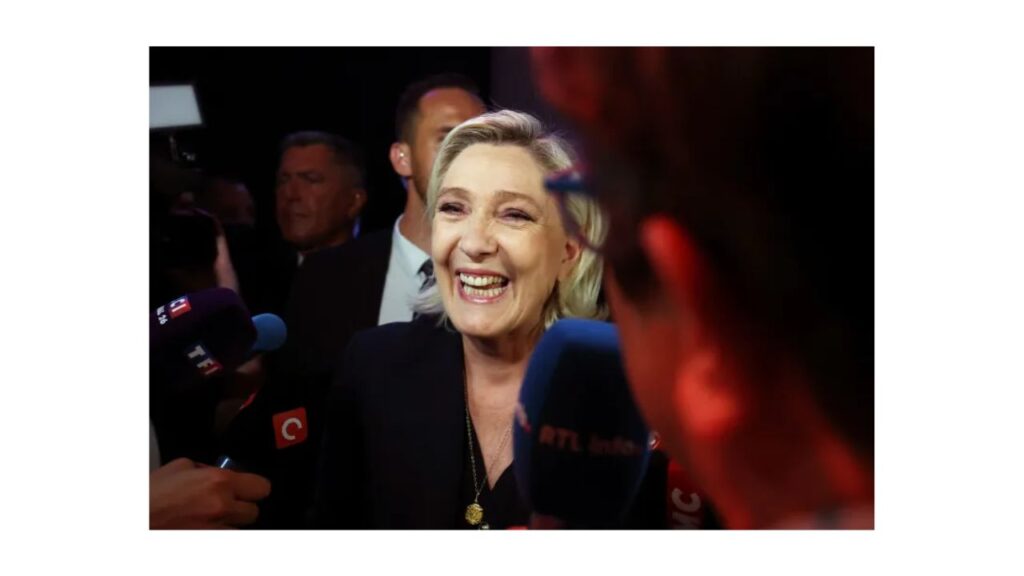According to exit polls, Marine Le Pen’s far-right National Rally party has won 34% of the vote in the first round of the French legislative elections.
High-stakes parliamentary elections in France gave the National Rally a commanding lead in the first round of voting on Sunday, handing President Emmanuel Macron yet another setback.
The far-left coalition known as the New Popular Front has garnered 28.1 percent of the vote, while Emmanuel Macron’s centrist Renaissance party has received 20.3%.
The ultimate composition of France’s next National Assembly will be decided in the second round of voting on July 7th for candidates who receive more than 12.5% of the vote.
According to the forecasts, Mr. Macron’s choice to have voters return to the polls for the second time in three weeks appeared to have backfired.
Following his party’s defeat in last month’s European Parliamentary elections to Ms Le Pen’s National Rally, he announced the snap poll.
According to French pollsters, Mr. Macron’s coalition of centrist parties may come in a distant third in the first round of voting.
According to those predictions, Macron’s team was aligned with Ms. Le Pen and a new left-wing alliance of parties that banded together to prevent her anti-immigration party, which has anti-Semitic past, from forming France’s first far-right administration since World War II.
But the final result of the election remained unclear with a whole week of campaigning still before the critical final voting on Sunday.
Mr. Macron’s camp has been “almost wiped out” in the first round, according to Ms. Le Pen.
Speaking to a joyful assembly that was waving blue, white, and red French tricolor flags, Ms. Le Pen urged voters who had not voted for her party in the previous round to come through with enough votes to give it a strong legislative majority.
Under that scenario, Jordan Bardella, Ms. Le Pen’s 28-year-old disciple, would take over as prime minister.
It would force Mr. Macron—who has declared he will not resign before his mandate ends in 2027—to enter an uneasy kind of power-sharing known as “cohabitation” in France.
Mr. Bardella urged people to support his party over that of the “dangerous far left”.
Mr. Bardella declared, “The choice is clear,” alleging that the left-wing alliance was pushing for “opening wide the doors for immigration” and “disarming the police.”
Leaders on the left were also criticized by him for “insulting institutions and anyone who thinks differently from them”.
“The time has come to put leaders at the head of the country who understand you,” he stated.
Leaders in politics, such as the PM and Macron, establish the “republican front” and call on people to protest the far-right
Mr. Macron urged supporters to support “clearly republican and democratic” candidates in a written letter to the media. According to his recent statements, this means that candidates from the RN and the hard-left France Unbowed (LFI) party would not be eligible.
Former prime minister Edouard Philippe specifically urged his party’s candidates to withdraw if they were in third place and to support those who weren’t the RN or LFI.
In an effort to stop the RN, the left-wing leaders of the Socialist and LFI likewise urged their third-placed contenders to withdraw.
Leader of the LFI Jean-Luc Melenchon declared that the NFP coalition, which came in second, will withdraw all of its third-place candidates from the first round.
“Our guideline is simple and clear: not a single more vote for the National Rally,” he stated.
In the second round of voting, Mr. Macron and Prime Minister Gabriel Attal urged people to turn out against the far-right.
Mr. Attal declared, “Not a single vote can go to the National Rally.”
“France does not deserve that.”
If his party secures an absolute majority, Mr. Bardella declared himself prepared to serve as prime minister.
He has disclaimed any intention of attempting to establish a minority government, and neither Mr. Macron nor the NFP will join forces with him.
“I will be a ‘cohabitation’ prime minister, respectful of the constitution and of the office of President of the Republic, but uncompromising about the policies we will implement,” he stated.
What happens next?
There are two rounds of voting for the 577 seats in the French National Assembly.
The top two candidates and any contender with more than 12.5% of the total number of registered voters in a constituency advance to a second round if no one wins outright in the first round.
The seat is won by the candidate with the most votes in the second round.
Due to the large participation on Sunday, over 300 constituencies may now face three-way runoffs, which should benefit the RN.
French center-left and center-right politicians have long engaged in what they refer to as a “republican front” strategy, in which the third-place candidate withdraws from the race and calls on supporters to unite behind the second-place candidate, in an effort to avert these three-way run-offs and block the RN.
It is up to Tuesday night for all contenders who advanced to the runoff to choose whether to withdraw or proceed to the next round.
However, the “republican front”‘s efficacy has diminished with time, and many voters no longer follow party leaders’ recommendations.
It is also possible that candidates, under pressure from political headquarters in Paris, may not withdraw.
However, the following 48 hours will be critical for negotiations, which might have a big impact on the outcome and could determine whether the RN gains an absolute majority in parliament or not.
This makes it very difficult to forecast the outcome of the second round. With regard to their own seat forecasts, even pollsters have advised caution.
